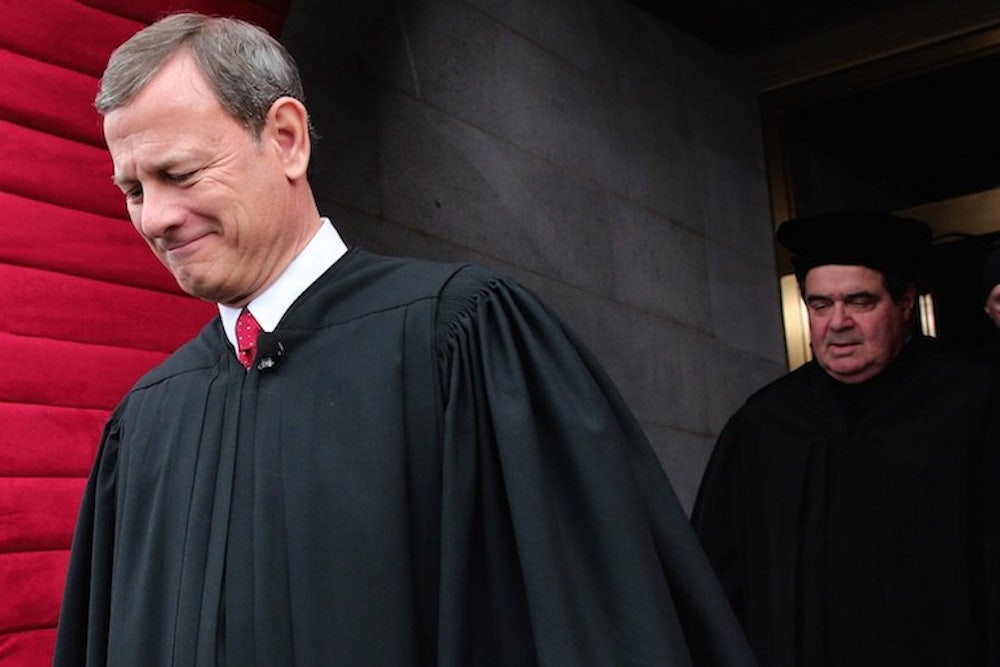Judicial modesty, as The New York Times' Adam Liptak observed Friday, was a theme of Chief Justice John Roberts’s opinions in the same-sex marriage and Obamacare cases. In the latter, the Court’s job was to implement the purpose of the statute, not to defeat it by cramped hypertechnical interpretation. “In a democracy, the power to make the law rests with those chosen by the people,” Roberts wrote. In the former, he dissented that “judges are unelected and unaccountable, and that the legitimacy of their power depends on confining it to the exercise of legal judgment.”
Liptak was careful not to endorse this claim of judicial restraint, and when one considers Roberts’s opinions in context—that is, beyond the context of these two decisions—the claim is hard to take.
For one thing, as Yale Law professor Jack Balkin writes, the dissenters in the marriage case “would sound a lot more convincing if they hadn't all joined the opinion in Shelby County v. Holder.” In that 2013 case, Roberts, writing for the court, declared a key provision of the Voting Rights Act unenforceable unless Congress rewrites it to account for the fact that racism isn’t as bad as it was in 1965, when the law was first enacted. (He knew perfectly well that Congress today is paralyzed by partisanship and will do no such thing.) The fundamental premise that drove Roberts’s analysis was the claim that there is no reliable connection between a centuries-long history of slavery, Jim Crow, and voter suppression and discrimination today. How does a modest judge know that?
And then there’s Parents Involved v. Seattle School District, a 2007 decision striking down a school district’s use of race-conscious means to prevent all-white and all-black schools. The equal protection clause’s central purpose is to end the subordination of black people, and that is precisely what the school district was trying to accomplish. Roberts, however, wrote that all racial classifications “promote notions of racial inferiority and lead to a politics of racial hostility”; they “reinforce the belief ... that individuals should be judged by the color of their skin.” Those are bad consequences, of course, but how does Roberts know that they are worse than the consequence of de facto segregated schools?
In short, Roberts is as much of a wild man as anyone on the Court. He is distinctive in the things that make him wild. But if you push the right buttons, restrained he isn't.
There is a limit to Roberts’s willingness to drink the right-wing Kool-Aid. It is difficult to say, in advance of a decision, where that limit is drawn. In NFIB v. Sebelius (2012), the first health care case, his opinion is full of sympathy for the challengers, ready to reshape constitutional law in accordance with their vision. He declared a range of previously unheard-of limits on congressional power, but ultimately concluded that striking down major legislation, enacted by a huge effort before anyone thought of those limits, went too far.
This term's health care case, King v. Burwell, is similar. It should never have been brought. Aside from the flaws in the legal arguments—they would have undermined the entire point of the statute on the basis of a dubious interpretation of a few sentences, which is not what statutory interpretation normally does—it deliberately aimed at serious harm to millions of Americans and a body blow to the U.S. economy.
Dartmouth professor Brendan Nyhan writes that what may look like a leftward tendency on the Supreme Court is actually the consequence of conservatives’ willingness to try out increasingly extreme legal theories in the Court, confident that some of them will persuade these judges. The fact that the claims in both health care cases made it as far as they did suggests that the conservative lawyers aren’t wrong. Claims that would have been summarily rejected a few years ago are now taken seriously by constitutional lawyers.
The strange nature of the claims in King v. Burwell, which construed the ACA to destroy the health insurance markets it was intended to reform, are enough to justify Roberts’s decision to reject those claims. But the appalling consequences had to give him pause. In the first health care case, with the 2012 election looming, Roberts had to worry about President Barack Obama, with a billion dollar budget, portraying the Court as a bunch of political hacks. But had the Court struck down Obamacare then, most people wouldn’t have felt the devastation of the decision because they weren’t yet receiving the law's benefits.
Now they are. Had the Supreme Court invalidated the challenged subsidies in King, it wouldn’t have just been the politicians going after the justices. There would have been signs on the Court steps saying, “John Roberts killed my mother.” Journalistic investigation would have confirmed that the signs were accurate. Not good for the Court as an institution, and for Roberts as its leader.
The essence of Roberts’s restraint is this: He is less of a zealot than his colleagues on his right. That isn’t saying much.
